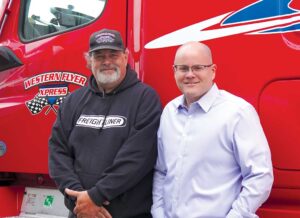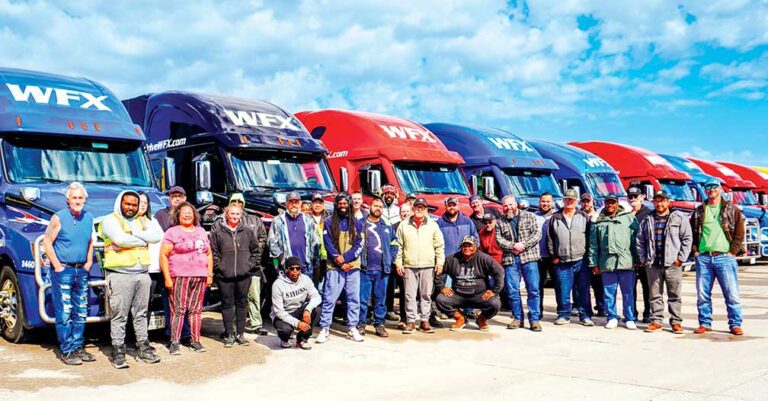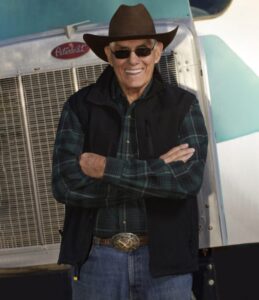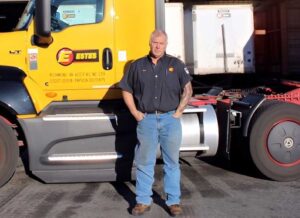Steady growth is the key to — and a sign of — success in any company. Since 1996, steady growth is exactly what Oklahoma City-based Western Flyer Xpress (WFX) has experienced in the trucking industry.
“We started with four trucks and four reefers,” said Randy Timms, CEO of WFX, in reference to the family-owned business he began with his parents over a quarter century ago. “We hauled broker loads west from Oklahoma, and returned with loads of produce for Oklahoma, Arkansas, Missouri, and Kansas.”
That was just the beginning.
“Somehow along the way, we ended up with a dry van,” Timms said. “I had to figure out how to load it and use it efficiently. Again, we looked for broker loads.”
The WFX team quickly discovered new opportunities in the dry load business.
“We’d work with pre-loaded trailers — drop one off and pick another up” Timms said. “We couldn’t do that with reefers, which were live load and unload. We started to understand how to become more operationally efficient.”
After getting their feet wet in the dry load business, the WFX crew started to work with a small shipper in Oklahoma City and bought about 10 dry van trailers. The results were so good that WFX steadily added five to 10 dry vans to its fleet each year, until the dry van business actually overtook the refrigerated side.
Eventually, dry van operation became such a better fit operationally that WFX actually exited the refrigerated business, Timms said. All the while, the company continued to grow, with a new focus on dry loads.

“We never had a year when we didn’t produce more revenue than the previous year,” Timms said.
Despite the success with dry vans, Timms didn’t rest on his laurels and grow complacent.
“We had a dispatcher who said he could bring in some good business if we had reefers,” he said. So, on a whim, he shared, WFX purchased 10 refrigerated trailers. Just like that, WFX was back to hauling both dry loads and temperature-controlled cargo.
Along the way, more opportunities to transport refrigerated loads came forward. In 2019, WFX acquired a small refrigerated company, pushing its refrigerated capacity to 350 reefer trucks.
The company continued to grow organically, both in dry and refrigerated cargo. Then, in January 2023, WFX joined forces with Indiana Western Express (IWX), a 250-unit reefer carrier. At that point, the combined companies owned a total of 4,000 trailers (a combination of reefers and vans) and a fleet of 800 reefer trucks and 675 dry van trucks.
Because the market was in a bit of a decline at that time, Timms said the timing of the decision to begin working with IWX probably wasn’t the best — but it has actually worked out well.
“(The combination of) WFX and IWX brought synergy to the table. We broker freight to them, and they broker freight to us — whatever produces the best synergies between the two companies,” Timms said.

In addition to WFX’s 1,100 or so drivers and IWX’s 250 or so drivers, the company employs another 350 people. Timms believes each member of the team is important.
“A company is a group of people,” he explained. “Between our drivers, contractors, techs working in the shop, and our operations and administration teams, we have an excellent group of people, and that has helped us succeed.”
Even so, as it is at any trucking business, employee turnover can sometimes become an issue that needs to be addressed.
“We aren’t any different than anyone else out there,” Timms said, adding that many drivers leave carriers for reasons other than dissatisfaction with policy or pay.
“Driver turnover is often the result of a life change,” he shared. “When your average guy on the street has a life change, he usually stays in the same job, because he or she is home every night and can deal with personal issues as well as maintain their career. When truckers have life changes, it upends their professional lives as well, because they can’t be away from home and deal with life changes.”
Timms also notes that WFX is competing for the same talent pool as all the other carriers in the industry. A lack of qualified company drivers in the U.S. has resulted in some carriers promising tempting benefits and bonuses to lure drivers away from their current jobs.
“We have some drivers who have been around 10 or 15 years, though,” he said.
When it comes to what sets WFX apart from other carriers, Timms stresses the organization’s diversity, both in people and in cargo. The company’s trailer fleet includes a “good blend of dry van and reefers,” he noted, which provides added flexibility in terms of types of cargo they can haul, along with creating operational efficiencies between the two trailer types.
In addition, WFX has a varied customer base, so the company isn’t dependent on any one product segment.
“No single customer makes up more than 10% of our business,” he said.
WFX has taken the concept of diversity beyond employees, customers, equipment, and cargo and expanded it to dedicated and end-route markets.
Because of this mind set, WFX has expanded to serve customers across the nation. That’s quite a jump from the modest Midwest to West Coast routes his family originally envisioned when founding the company back in 1996.
Today, WFX has terminals in Oklahoma, Texas, Nebraska, Missouri, and Arizona, along with drop yards in Georgia, Tennessee, Kansas, New Jersey, Colorado, Washington, Illinois, North Carolina, Florida, and California. The company offers local, regional, dedicated, and OTR lanes for both solo and team drivers.
“Our diversity opens us to opportunities,” Timms said — and opportunity is yet another key ingredient for success at WFX.
This article originally appeared in the January/February 2024 edition of Truckload Authority, the official publication of the Truckload Carriers Association.
Dwain Hebda is a freelance journalist, author, editor and storyteller in Little Rock, Arkansas. In addition to The Trucker, his work appears in more than 35 publications across multiple states each year. Hebda’s writing has been awarded by the Society of Professional Journalists and a Finalist in Best Of Arkansas rankings by AY Magazine. He is president of Ya!Mule Wordsmiths, which provides editorial services to publications and companies.











